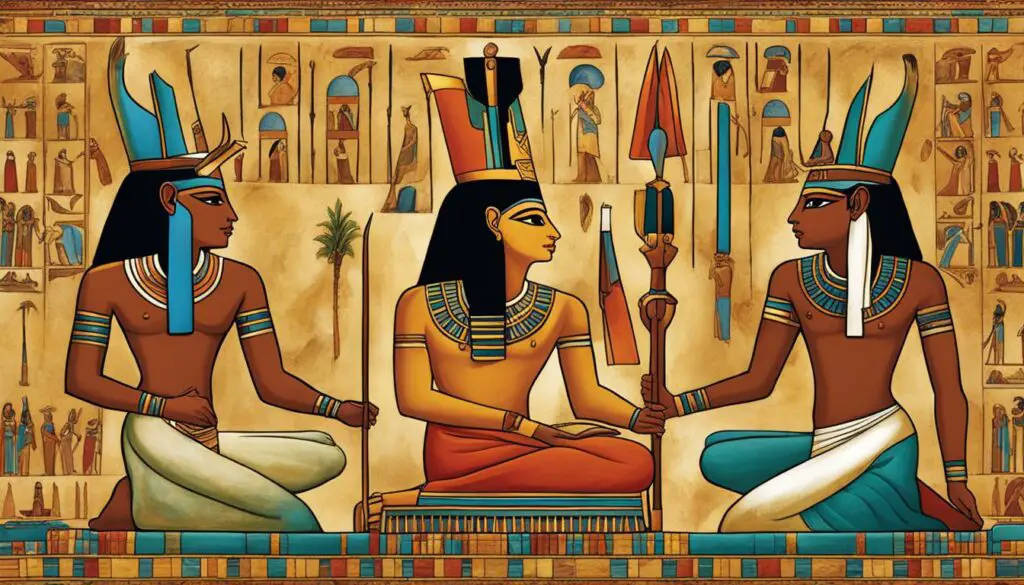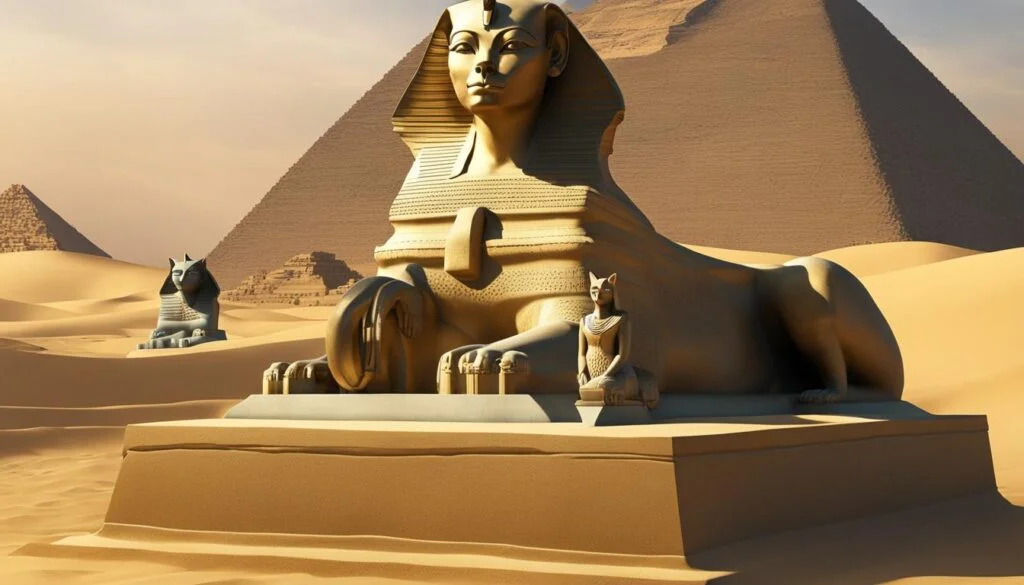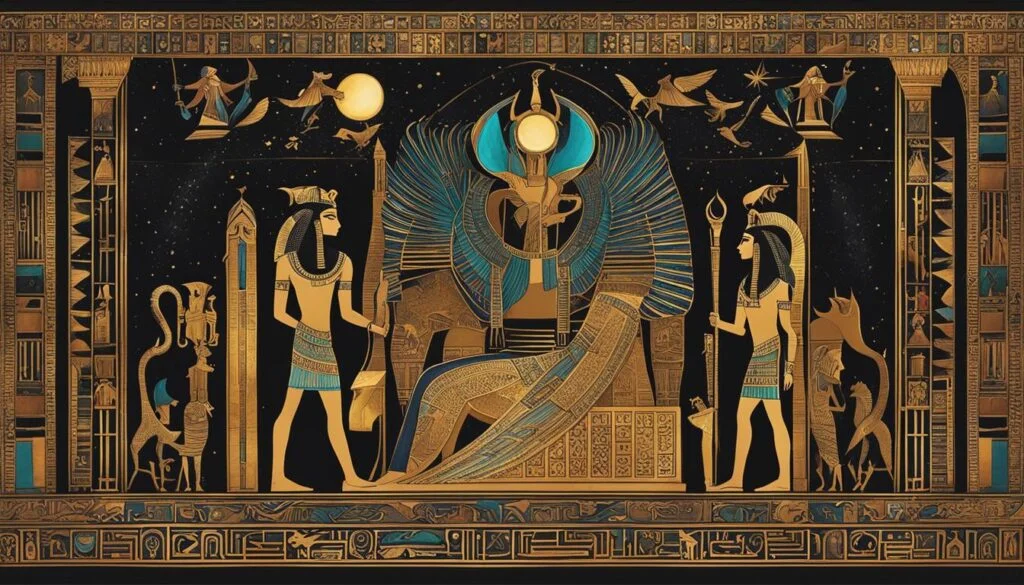The ancient Egyptians had a deep reverence for their gods and goddesses, with over 2,000 deities in their pantheon. These ancient Egyptian deities played a vital role in the religious beliefs and practices of this ancient civilization. Each deity represented different aspects of the natural and supernatural world, and the Egyptians believed that by honoring and appeasing these gods, they could maintain cosmic balance and ensure continued harmony in their lives.
Key Takeaways:
- Ancient Egypt worshipped over 2,000 gods and goddesses.
- These deities represented various aspects of nature and the supernatural world.
- Offering prayers, rituals, and offerings to these gods were believed to maintain divine order.
- The gods played a central role in the everyday lives of the ancient Egyptians.
- Their worship ensured protection, guidance, and harmony in the cosmic order.
The Role of Gods in Ancient Egyptian Religion
In ancient Egyptian religion, the gods played a central and significant role in the lives of the people. They were believed to have control over natural phenomena and the destiny of individuals.
The Egyptians engaged with the gods through various means, such as prayers, rituals, and offerings, seeking their assistance, guidance, and protection. The worship of gods was deeply ingrained in the fabric of Egyptian society and formed an integral part of their religious beliefs and practices.
The gods were seen as the guardians of ma’at, the concept of cosmic balance and harmony in the world. The Egyptians believed that by maintaining a harmonious relationship with the gods, they could ensure order and stability in their own lives and in society as a whole.
The Complexity of Ancient Egyptian Deities
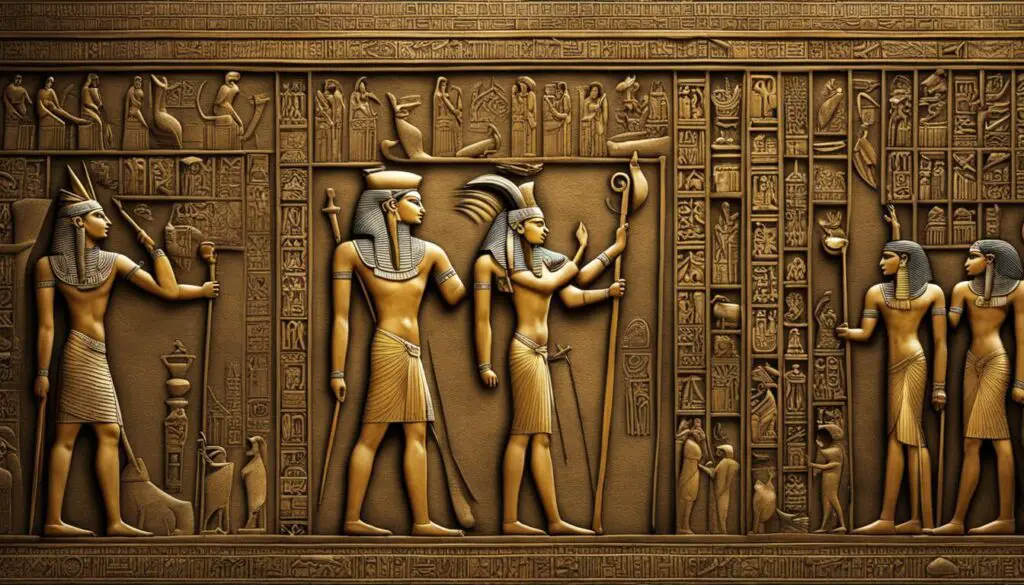
The gods in ancient Egyptian mythology exhibited a remarkable level of complexity, as evident in their intricate relationships and diverse appearances. These deities were depicted in various forms, such as animals, humans, objects, or a combination of these, each symbolizing their unique attributes and characteristics.
The ancient Egyptians believed that each god possessed specific traits and played distinct roles in the cosmic order. These traits and roles were conveyed through myths, hieroglyphs, and religious art, emphasizing their connection to different aspects of life and nature.
Some gods had specific domains, governing areas such as fertility, war, or craftsmanship. For instance, Ptah, the god of creation and craftsmanship, was portrayed as a man wearing a skullcap and holding a staff and an ankh. Others, like Thoth, the god of wisdom and writing, had more generalized roles and encompassed a broader range of influences within the pantheon.
Understanding the complexity of ancient Egyptian deities offers valuable insights into their mythology, culture, and worldview. It reveals the intricate tapestry of beliefs, symbols, and stories that shaped the ancient Egyptian civilization, leaving an indelible mark on human history.
The image above represents the diversity and complexity of the ancient Egyptian pantheon, showcasing the multitude of gods and goddesses worshipped by this ancient civilization.
Major Gods in the Egyptian Pantheon
The ancient Egyptians revered a diverse array of gods and goddesses, each with their own unique roles and attributes. Here are some of the most prominent deities in the Egyptian pantheon:
- Amun – Also known as Amun-Ra, Amun was the powerful god of the sun and kingship. He was considered the most important deity during the New Kingdom period.
- Ra – Ra was the god of the sun and the creator of the world. Egyptians believed that Ra sailed across the sky during the day and journeyed through the underworld at night.
- Osiris – Osiris was the god of the afterlife and the judge of the dead. He played a crucial role in the resurrection and eternal life of the deceased.
- Isis – Isis, the wife of Osiris, was the goddess of fertility, magic, and motherhood. She was revered as a protective deity and was often depicted with her son Horus.
- Horus – Horus was the god of the sky and the protector of the pharaoh. He was often depicted as a falcon or as a man with the head of a falcon.
- Hathor – Hathor was the goddess of love, beauty, joy, and music. She was also associated with childbirth and offered protection to the pharaoh.
- Anubis – Anubis was the god of embalming and the protector of the dead. He guided souls through the afterlife and oversaw the mummification process.
These major gods held significant importance in the ancient Egyptian religion and were worshipped throughout the history of the civilization. Their stories and influence continue to captivate and inspire people to this day, making them truly timeless figures in human history.
Lesser-Known Deities in Egyptian Mythology
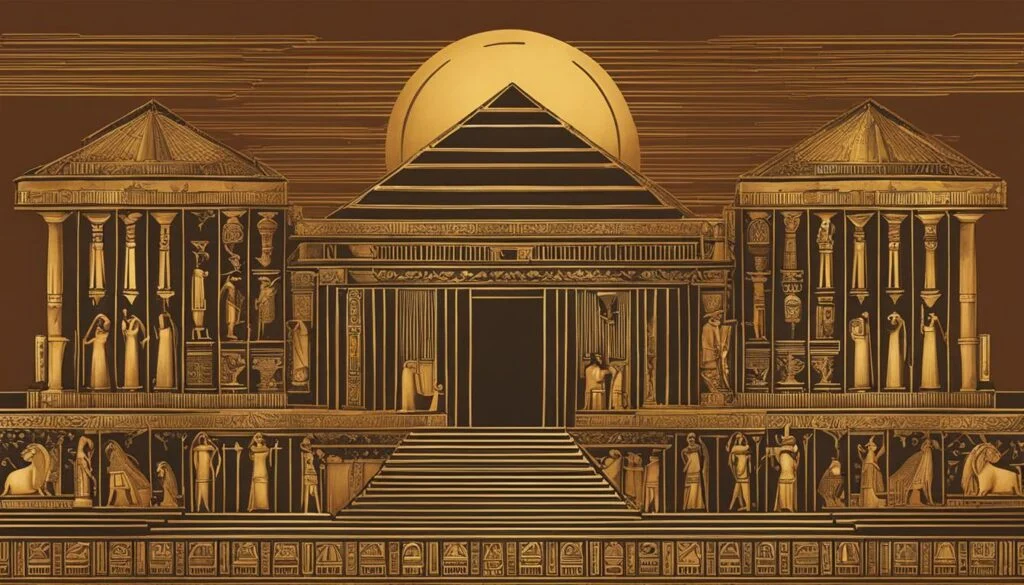
In addition to the major gods, the Egyptian pantheon included numerous lesser-known deities who had specific roles or associations. These lesser-known deities played a significant role in the religious beliefs and practices of the ancient Egyptians.
Bastet
Bastet was the goddess of music, dancing, and pleasure. She was often depicted with the head of a lioness or a domestic cat, symbolizing her role as a protector against evil spirits. Bastet was revered for her playful and nurturing nature, bringing joy and happiness to the lives of the worshippers.
Bes
Bes was a dwarf god who protected against evil spirits and misfortune. He was often depicted as a jovial figure, with a lion-like face, standing on his tiptoes. Bes was beloved by the Egyptians for his ability to ward off evil and bring good fortune, especially in domestic settings such as childbirth and homes.
Khnum
Khnum was the ram-headed creator god who guarded the source of the Nile, the lifeblood of Egypt. He was believed to shape human bodies on his potter’s wheel and controlled the flooding of the Nile, ensuring fertility and abundance for the land. Khnum was deeply revered as the protector of the life-giving waters of the Nile and the source of all creation.
These lesser-known deities, like Bastet, Bes, and Khnum, may not be as widely recognized as the major gods in the Egyptian pantheon, but they played crucial roles in the religious beliefs and practices of the ancient Egyptians. Their unique attributes and associations showcased the intricate and diverse nature of the Egyptian pantheon.
Mythology and Legends Surrounding Egyptian Deities
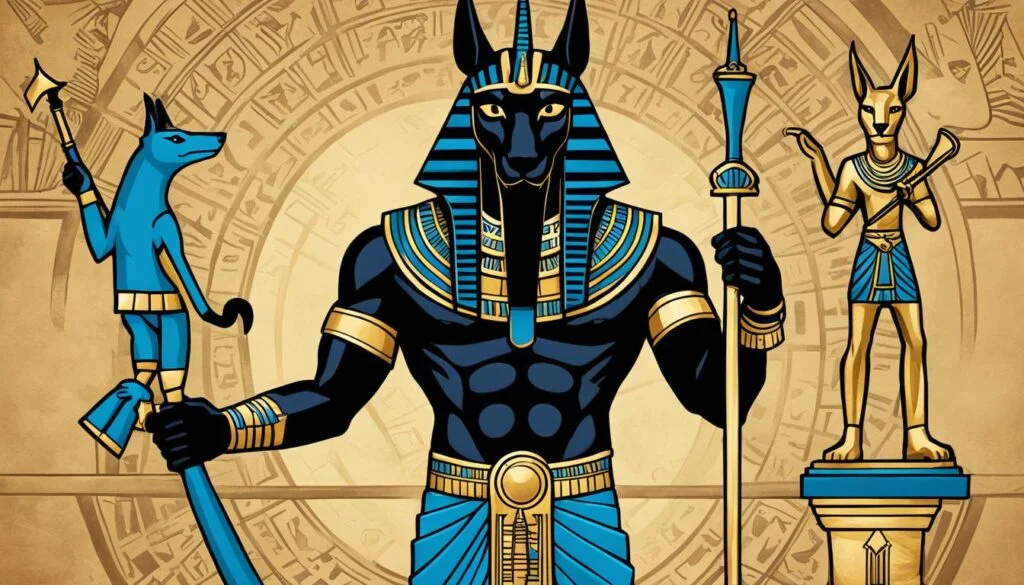
Egyptian mythology is a treasure trove of captivating tales and legends centered around the gods and goddesses of ancient Egypt. These mythological stories not only entertain but also offer insights into the Egyptians’ beliefs and understanding of the world.
The myths often provide explanations for natural phenomena, such as the rising and setting of the sun or the flooding of the Nile. They also delve into the origin of the world and important events in the lives of the deities.
One such prominent myth is the story of Osiris, the god of the afterlife and fertility, and his brother Set. In this myth, Set murders Osiris out of jealousy and scatters his body parts across Egypt. The tale follows the journey of Osiris’ sister-wife, Isis, as she searches for and eventually reassembles his body. Through her unwavering devotion, Osiris is resurrected, symbolizing the cyclic nature of life, death, and rebirth.
Another well-known myth is the conflict between Horus, the sky god, and Seth, the god of chaos and destruction. This myth portrays the eternal struggle between good and evil, with Horus seeking justice and revenge for the murder of his father, Osiris, by Seth.
These myths served a vital role in ancient Egyptian society, reinforcing moral and religious teachings and helping individuals make sense of the world around them. They were shared through oral tradition and depicted in hieroglyphs and ancient artworks, perpetuating the stories and their lessons throughout generations.
The tales of Egyptian mythology continue to captivate people to this day, their enduring relevance evident in the presence of these mythical figures in modern literature, films, and popular culture. The rich symbolism and complex narratives of the Egyptian myths provide a timeless exploration of universal themes and human experiences.
From the struggles between gods and the eternal quest for balance to the vivid imagery and larger-than-life characters, the mythology surrounding Egyptian deities offers a captivating glimpse into the ancient Egyptians’ spiritual beliefs and their understanding of the world.
By delving into these myths, we gain a deeper appreciation for the profound impact of Egyptian mythology and its enduring legacy in our modern society.
Worship and Rituals Associated with Egyptian Deities
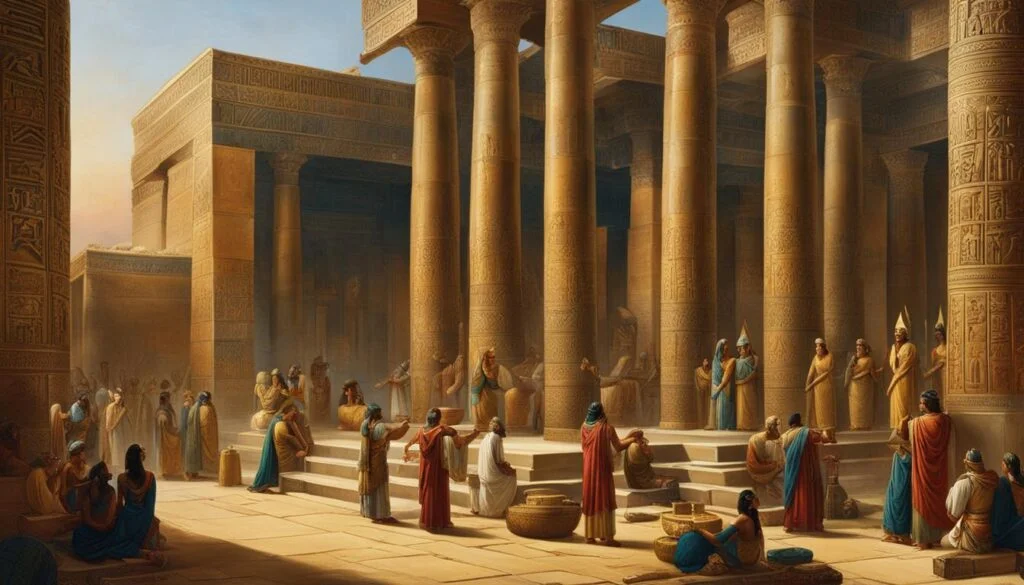
The ancient Egyptians had a deep reverence for their gods and goddesses, and they expressed this devotion through various rituals and ceremonies.
One of the central practices of Egyptian religion was the construction of temples dedicated to specific deities. These sacred spaces were believed to be the dwelling places of the gods, and they served as focal points for religious activities.
Inside the temples, priests and priestesses performed daily offerings and prayers to appease and honor the gods. They acted as intermediaries between the people and the divine, performing rituals and communicating with the deities on behalf of the community.
The rituals conducted in the temples involved a wide range of activities, including purification ceremonies, processions, and the recitation of prayers and hymns. These rituals played a crucial role in maintaining the cosmic order and ensuring the well-being of individuals, communities, and the kingdom as a whole.
The temples themselves were adorned with statues, carvings, and hieroglyphs depicting the gods and goddesses. These elaborate decorations served to honor and glorify the deities and create a sacred atmosphere within the temple walls.
Additionally, the ancient Egyptians believed that by making offerings to the gods, they could secure divine favor, protection, and prosperity. These offerings included food, drink, incense, and valuable objects, which were presented to the gods as a sign of devotion and gratitude.
Overall, the worship and rituals associated with Egyptian deities were an integral part of ancient Egyptian religious life. They served to strengthen the bond between the people and their gods, ensuring their continued favor and blessings.
To continue reading about the fascinating world of ancient Egyptian deities, proceed to the next section: “The Concept of Monotheism in Egyptian Religion.”
The Concept of Monotheism in Egyptian Religion
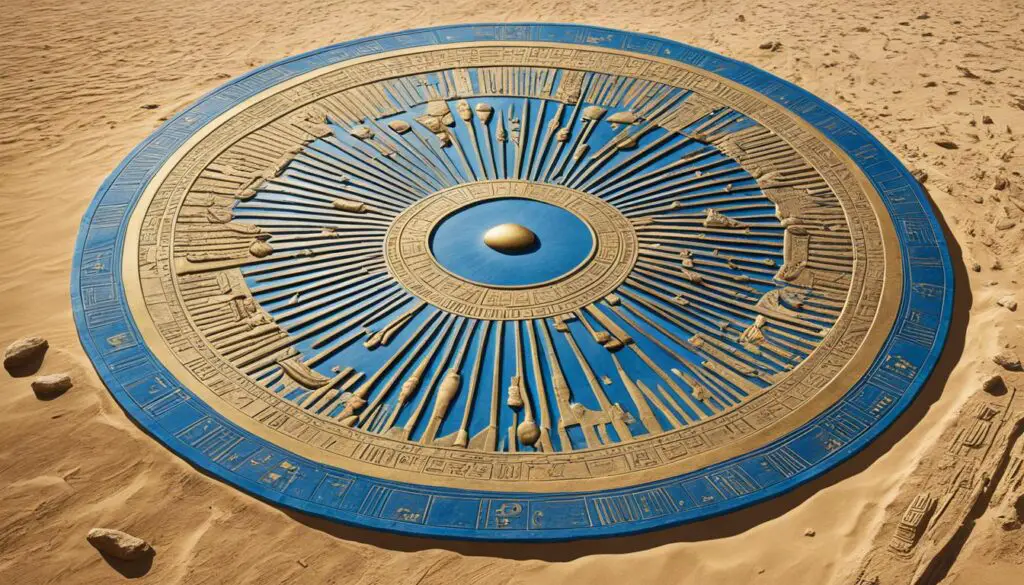
The religion of ancient Egypt is widely known for its polytheistic beliefs and diverse pantheon of gods and goddesses. However, there were instances in history when the concept of monotheism emerged, deviating from the traditional religious practices of ancient Egypt.
During the reign of Pharaoh Akhenaten in the 14th century BC, a remarkable shift occurred in Egyptian religious beliefs. Akhenaten introduced a monotheistic worship centered around the sun disc Aten, rejecting the established pantheon of gods worshipped by the Egyptians.
This period of religious transformation came to be known as Atenism. It represented a significant departure from the traditional polytheistic beliefs and practices that had been deeply ingrained in Egyptian society for centuries.
Atenism focused on the worship of a single deity, the sun disc Aten, as the supreme and universal god. Akhenaten sought to consolidate religious power and establish a new religious order by promoting the worship of Aten and diminishing the importance of other deities.
However, the monotheistic phase of Atenism was short-lived. After Akhenaten’s death, the traditional polytheistic beliefs were reinstated, and the pantheon of gods regained their prominence in Egyptian religion.
This brief episode of monotheism in Egyptian history demonstrates the complexity and evolution of religious beliefs and practices in ancient Egypt. It highlights the society’s willingness to adopt and experiment with different religious ideologies and the enduring influence of traditional polytheistic beliefs in Egyptian mythology and culture.
The Continued Influence of Egyptian Deities
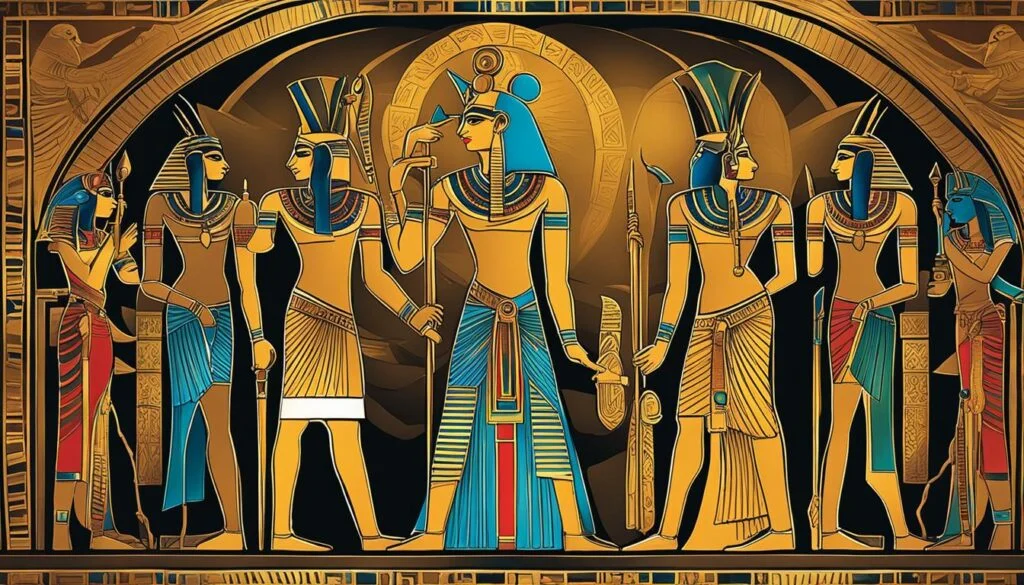
Although ancient Egyptian civilization has long since passed, the influence of their gods and religious beliefs can still be seen today. The depictions of Egyptian deities and symbols are often used in art, architecture, and popular culture. Many people still find inspiration in the tales and teachings of the ancient gods, and their images continue to captivate and intrigue. Additionally, aspects of Egyptian mythology have been incorporated into various contemporary belief systems, such as Kemeticism and several New Age spiritual practices.
The Legacy of Egyptian Deities in Modern Society
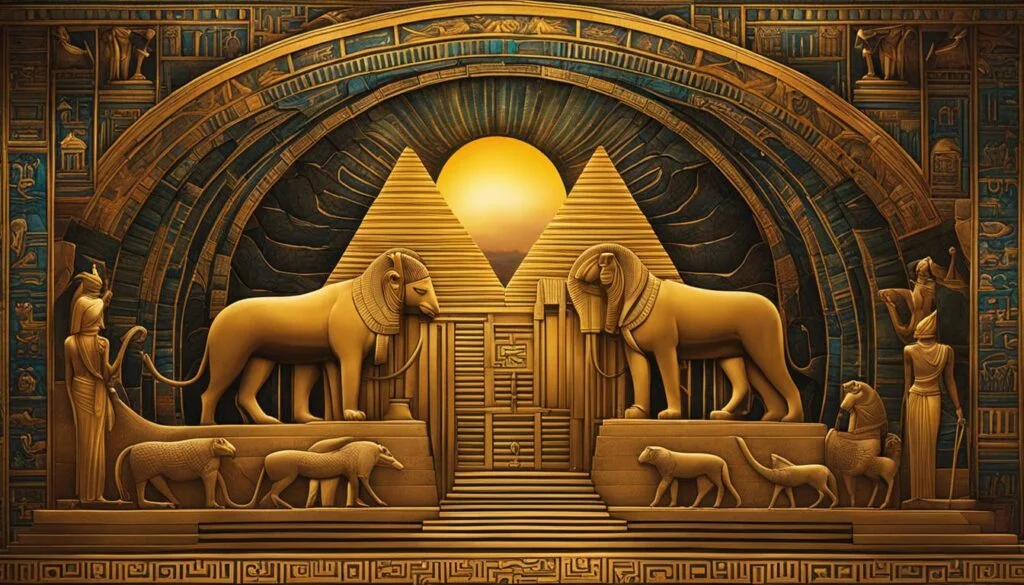
The ancient Egyptian deities hold a timeless legacy that transcends their mythological and religious origins. These gods and goddesses embody universal human traits and archetypes, making them relatable and relevant in modern society.
- Power: The gods of ancient Egypt symbolize power, whether it’s the might of Ra, the sun god, or the authority of Amun, the king of the gods.
- Wisdom: Thoth, the god of knowledge and writing, represents wisdom and intellectual pursuits, inspiring seekers of knowledge in the present day.
- Love: The goddess Hathor, with her association with love, beauty, and joy, serves as a symbol of love and affection.
- Protection: The lioness-headed goddess Sekhmet and the falcon-headed god Horus are revered for their protective qualities, offering guardianship to those in need.
These deities continue to influence various forms of art, literature, and popular culture. Their depictions grace paintings, statues, and jewelry, adding an element of mystique and fascination to modern artistic creations. The tales and symbols associated with the Egyptian pantheon often find their way into books, movies, and video games, captivating audiences and preserving the cultural impact of these ancient deities.
A Fascinating Exploration of Egyptian Deities
Exploring the world of ancient Egyptian deities is a captivating journey into a rich and complex mythological and religious system. The vast pantheon of gods and goddesses offers a glimpse into the beliefs, values, and cosmology of one of the world’s most ancient civilizations.
Understanding the roles, characteristics, and myths associated with these deities provides valuable insights into the culture and mindset of ancient Egyptians. The diverse nature of the Egyptian god list showcases the range of human experiences and aspirations that were addressed through religious practices.
The ancient Egyptians believed that these deities had the power to influence natural events and human lives. By delving into the stories and symbolism of the Egyptian gods, we can explore the ways in which these ancient people sought meaning, connection, and guidance from divine forces.
From the powerful gods like Amun, Ra, and Osiris to the lesser-known deities, each god and goddess had their own unique attributes and significance in the lives of the ancient Egyptians. The egyptian mythology and gods offer a window into their worldview and their understanding of the natural and supernatural realms.
The Divine Pantheon
- Amun: The powerful sun god and one of the most prominent deities in ancient Egypt.
- Ra: The sun god and creator of the world, worshipped widely across Egypt.
- Osiris: The god of the afterlife and judge of the dead, associated with resurrection and eternal life.
- Isis: The goddess of fertility and magic, known for her protective and nurturing qualities.
- Horus: The god of the sky and protector of the pharaoh, embodying divine kingship.
These are just a few examples of the gods and goddesses in the Egyptian pantheon. Each deity played a specific role and had unique characteristics that contributed to the complex religious and mythological framework of ancient Egypt.
Exploring the world of ancient Egyptian deities takes us on a journey through time and culture, shedding light on the beliefs and practices of one of the world’s most fascinating civilizations. It is a testament to the enduring power of mythology and the human quest for understanding and connection to the divine.
Join us in the next section as we delve deeper into the mythology and legends surrounding Egyptian deities, unraveling the captivating stories and meanings behind their divine presence.
Conclusion
The ancient Egyptian pantheon of gods and goddesses offers a captivating glimpse into the rich religious and mythological beliefs of this ancient civilization. From the mighty Amun, Ra, and Osiris to the lesser-known deities associated with specific regions and roles, the Egyptian pantheon presents a diverse and comprehensive understanding of their world. The worship and rituals dedicated to these deities held a significant place in the daily lives of ancient Egyptians, providing them with a sense of purpose, guidance, and a profound connection to the divine.
The influence of these ancient Egyptian deities continues to permeate various aspects of art, culture, and spirituality even today. Their depictions adorn precious artifacts, ancient temples, and modern artwork, reflecting their enduring presence and captivating qualities. The fascinating exploration of these deities inspires people worldwide, offering a glimpse into the intriguing world of ancient Egypt and the complexities of their religion and mythology.
Through their worship and devotion, the ancient Egyptians sought to maintain cosmic balance and secure divine favor. The gods and goddesses represented different aspects of nature, life, and the afterlife, reflecting the ancient Egyptians’ deep reverence for the forces that shaped their lives. Today, the study and appreciation of Egyptian mythology and gods provide insights into the culture, values, and spiritual beliefs of one of the world’s most ancient civilizations. The legacy of these deities endures, as their stories invoke a sense of wonder, connecting us to our shared human history.
FAQ
How many gods are there in Egyptian mythology?
There are over 2,000 deities in the Egyptian pantheon.
What role did gods play in ancient Egyptian religion?
The gods were believed to control natural events and human lives. Egyptians sought their help, guidance, and protection through prayers, rituals, and offerings.
What makes ancient Egyptian deities complex?
The gods in Egyptian mythology have diverse appearances and intricate relationships. They represent various aspects of life, nature, and cosmic order.
Who are some major gods in the Egyptian pantheon?
Major gods include Amun, Ra, Osiris, Isis, Horus, Hathor, and Anubis. They each have specific roles and associations.
Are there lesser-known deities in Egyptian mythology?
Yes, lesser-known deities include Bastet, Bes, and Khnum, among others. They have specific roles or associations.
What kind of stories and mythology are associated with Egyptian deities?
Egyptian mythology explains natural phenomena, the origin of the world, and important events in the gods’ lives. These stories served as moral and religious teachings.
How did ancient Egyptians worship their gods?
They conducted rituals and ceremonies, built temples, and performed daily offerings and prayers. The rituals were performed by priests and priestesses who acted as intermediaries between people and the gods.
Did ancient Egyptian religion ever have a concept of monotheism?
Yes, during the reign of Akhenaten, the pharaoh introduced a monotheistic worship of the sun disc Aten. However, this phase was short-lived, and traditional polytheistic beliefs were reinstated.
How do Egyptian deities continue to influence society today?
Depictions of Egyptian deities and symbols are still used in art, architecture, and popular culture. Some aspects of Egyptian mythology have also been incorporated into various contemporary belief systems.
What is the legacy of Egyptian deities in modern society?
Egyptian deities embody timeless human traits and archetypes. They serve as symbols of power, wisdom, love, and protection, inspiring art, literature, and popular culture.
Why are Egyptian deities a fascinating exploration?
Exploring Egyptian deities offers insights into the beliefs and cosmology of an ancient civilization and provides a fascinating exploration of human spirituality and the quest for meaning.


